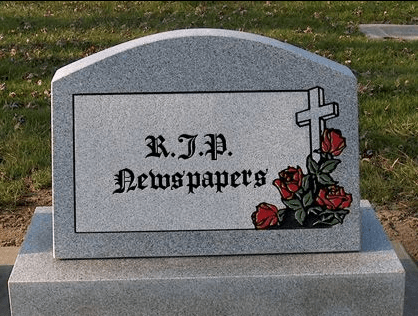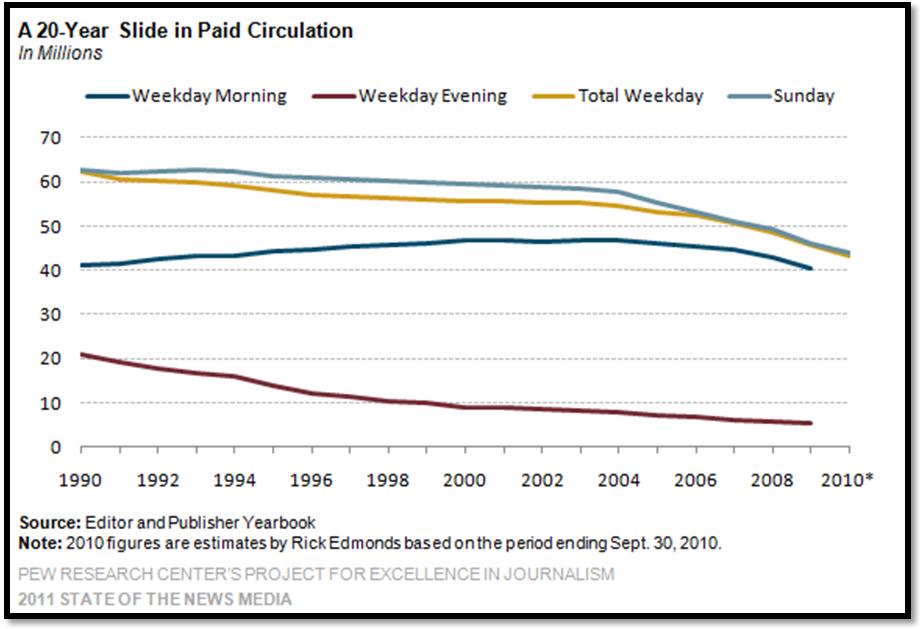First, it was rock and pop stars dying on the weekend.
Then it was tornadoes.
Now Mitt Romney chooses Saturday morning at 9am ET to announce his new running mate, Paul Ryan.
For some reason, big news keeps happening on Saturday and Sunday when many media outlets are staffed with part-timers – or worse, automation systems.
There was probably no shortage of news/talk radio stations caught flat-footed by the biggest political announcement of the summer, the naming of a surprise VP nominee.
But so was the New York Times.
Think about the timing…
There were heavy rumors about Romney announcing Ryan on Friday night. Early Saturday morning, my phone was blasting with texts from multiple news sources that had the story. And at 9am ET on Saturday, the event took place in Norfolk.
So 24 hours later, I grab my Sunday edition of the New York Times and while the story was all over the front page, the OpEd section was devoid of any Ryan analysis. In fact, there was an already dated piece about Romney’s tax policies.
Why does this matter? Our newest Public Radio Tech Survey shows a drop in daily newspaper readership (print or online), and that’s among the most educated radio audience on the planet.
And the circulation figures speak for themselves. If radio’s cume audiences were dropping like these numbers, it would be panic time for the RAB, the NAB, and every broadcaster in America.
In the meantime, I was reading Paul Ryan stories online at Huffington Post, and on my news apps for more than 24 hours in anticipation of the Times’ “take” the next day. That’s the expectation that consumers have for their go-to brands, whether they’re newspapers or radio stations.
So if a rock star passes away over a weekend or when calamitous weather blows through town, isn’t it a radio station’s duty to get some core staffers back to work to cover the event?
And in the Times’ case, you mean to tell me that Paul Krugman, Maureen Dowd, and Gail Collins couldn’t be bothered over a weekend to do their jobs – to provide timely, essential coverage and perspective for one of the biggest news stories of the year?
FM chip or no, radio has to step up to the plate and do what the audience “hires” it to do during crunch time. And while no one begrudges the newspaper industry saving money during this turbulent era for traditional media, don’t these fiscally conservative policies further erode an already dwindling industry?
 There’s a price to austerity. Just ask the Greeks. It’s easy to slash and burn and save lots of money.
There’s a price to austerity. Just ask the Greeks. It’s easy to slash and burn and save lots of money.
But to provide the kind of services that consumers demand and expect from brands requires having to pragmatically make some big audibles when the game’s on the line. It’s expected that the newspaper will be on your doorstep during slow news days, but it’s imperative that your news provider do what’s required when it really counts.
Over that weekend, the New York Times dropped the ball.
Hopefully, radio operators were taking notes.
- Media And Technology In 2025: Believe It Or Not! - April 18, 2025
- In Radio, You Just Never Know - April 17, 2025
- The Secret To Making A Great Podcast (And Great Radio) - April 16, 2025





Another take on the Paul Ryan announcement was that it was done precisely on a Saturday morning to avoid critical coverage by the first stringers. Not that this is an excuse for the top players; they surely could have posted a ‘gut check’ reaction piece and check back for more on the story after some vetting. Also, I don’t know if the majority of the listeners, viewers, and readers were waiting with as much bated breath as you were for the NYT take on this story.
Finally, as it relates to Radio and this:
“So if a rock star passes away over a weekend… isn’t it a radio station’s duty to get some core staffers back to work to cover the event?”
One not so black and white answer is maybe.
When a death happens on the weekend, one can expect the weekend jock to do the annoucement(s) and should at least be pointing listeners to the higher-exposure dayparts with top personalities for their take on it. Pulling in the morning show for a rock star death on the weekend may not always be the best course. Prepromoting the personalities where they have the widest reach is always a good bet.
Ben, I agree that the Ryan announcement was timed to avoid intense media coverage. But when THE newspaper in the U.S. (with apologies to the Wall Street Journal) misses the chance to provide perspective and commentary on an event that rocked the nation, it’s a lost opportunity.
As for radio, I’m not suggesting that Bob & Tom be called away from vacation, but most music stations are voicetracked all or most of the weekend, How tough is it to get a frontline jock – middays or afternoons – back to providing more than you get from Pandora or Spotify? It’s not about when people are listening, but it is about providing expected service, especially when it counts.
Thanks for taking the time to comment and reading our blog.
Usually, I have a general idea of who is around and can text them to get into the station to make the necessary changes to on-air, web, and social networks. It’s tougher with a smaller staff but way possible to have “shifts” where someone is “on call”.
You’re right, Lenny. It’s about having an emergency plan in place to ensure you’ve got systems that can handle just about anything. Thanks for the note.
Hey Fred,
Framed in the context of a VTed station, I agree.
Naturally, if a major in-format musician kicks it, you dump out of VT.
If a minor in-format musician kicks it, a middle ground could be getting a local voice to put a package together that can run in a promo position (a la a cross promoting Entertainment Report in PMD with the AMD voice).
Just a thought.
Ben, that sounds logical. Now if we could just get stations, clusters, and companies to sit down and meet on this issue, hammering out a basic plan of operation for these what if’s would be simple. Thanks for continuing to think it through.
Yea, I remember being on the air when john lennon was shot. Hard to voice track (or Pandora) for that one. The station I worked for at the time (WSHE) was a community hub for south florida back then. Yea, radio stations used to be a community of listeners! News/Talkers undoubtedly “dropped the ball” on your example. Think about it, it’s even worse for Talk. Most Talk stations on the weekend are not even the same format that they are during the week. (outside of the fact that it’s people talking) Most weekends on Talkers are either sold for block time with real estate hawkers, car shows run by the local used car dealership, dollar a holla’ and the like. Then you have to ask yourself the question, even if you have a “live” talent on the air, are they even able to handle an “event.” Can you honestly say that your talent really “knows what to do” if the President get’s shot? Or would even have the sense or know how to put callers on the air and interact with them at a music station if some event like Lennon getting murdered happened? This is a conversation all PD’s should have with talent. Of course, this is also assuming that a lot of PD’s would even know how to handle such an event themselves.
Thanks, John. And the one thing we know is that emergencies will happen again. We just don’t know when they will occur. Radio, TV, and print veterans will tell you that some of their best days were during emergencies and “breaking news” events when they really felt they were providing an important service. It is about having a plan in place, and then making sure you execute it. Appreciate your comments.